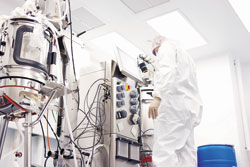By Susan Haigney
BioPharm International spoke with Trevor Marshall, director of enterprise systems integration at Zenith Technologies, about automating processes in upstream processing.
 BioPharm: What specific challenges do companies face when automating upstream processes?
BioPharm: What specific challenges do companies face when automating upstream processes?
Marshall: New product introductions into existing facilities often require new equipment process capabilities that are not known when the facility is first commissioned. The challenge facing most projects is understanding what is coming in the latest technology transfers, as this is not necessarily what product the facility will originally start with and then trying to provide the agility within the software to cope with the process changes in the future. Customers are looking for new product introductions (NPIs) to take place in their facilities within weeks, not months and years.
BioPharm: What should be considered when developing strategies for process control in upstream processing?
Marshall: The bioreactor or fermenter is the upstream equipment that has the most control strategies: DO2 control, pH control, temperature, agitator, and pressure control. The process control system needs to be developed in a manner that is flexible enough to have different strategies enabled dependent on the product. An example might be different DO2 control strategies (e.g., proportional integral derivative [PID] control split range, PID control ratio control, PID control O2 only, PID control air only). These different strategies are devised typically based on the optimum control for the product line already in the facility. Other strategies may be required for new products, and the challenge is to build the right level of capabilities without creating control strategies that will never be used.
BioPharm: Which technologies are available for monitoring processes in upstream processing? Which are preferred?
Marshall: Distributed control system/process control system (DCS/PCS) continues to be the technology of choice for most companies in large biologics facilities. Typical vendors would be Siemens PCS 7, Emerson DeltaV, Rockwell PlantPax, and ABB 800xA.
BioPharm: Which systems involved in upstream processing are served best by process controls?
Marshall: All major process equipment involved in upstream processing is typically controlled by the DCS/PCS systems. In the past, the seed lab area may have been an area where equipment items were manually controlled, but some of these have now also started to be integrated to the process control systems.
BioPharm: How do data collection and data integrity factor into process controls?
Marshall: This is a very important area associated with process control systems, and the collection and the protection of these data is paramount for regulators. Proving data integrity is one of the most important aspects of any control system as the data coming from these systems is replacing traditional paper-based systems. If the place of record for data no longer resides on a paper record, then the integrity of the data, how it is produced and stored in the PCS is a key component for the disposition of batches to the market. Biopharma companies are focused on 21 Code of Federal Regulations Part 11 assessments to document which aspects of the regulation are covered by the control system and which aspects may be covered via procedures in the operations of the facilities.